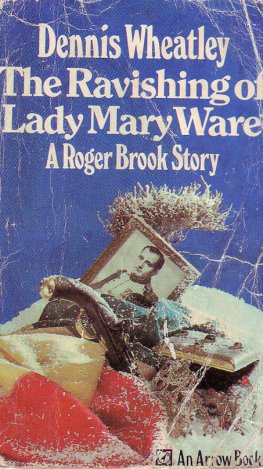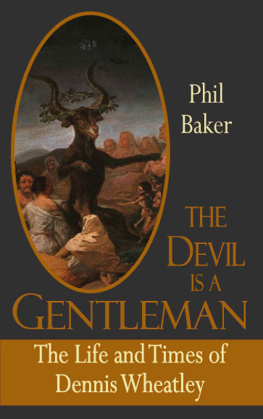Dennis Wheatley - The Satanist
Here you can read online Dennis Wheatley - The Satanist full text of the book (entire story) in english for free. Download pdf and epub, get meaning, cover and reviews about this ebook. genre: History. Description of the work, (preface) as well as reviews are available. Best literature library LitArk.com created for fans of good reading and offers a wide selection of genres:
Romance novel
Science fiction
Adventure
Detective
Science
History
Home and family
Prose
Art
Politics
Computer
Non-fiction
Religion
Business
Children
Humor
Choose a favorite category and find really read worthwhile books. Enjoy immersion in the world of imagination, feel the emotions of the characters or learn something new for yourself, make an fascinating discovery.

- Book:The Satanist
- Author:
- Genre:
- Rating:5 / 5
- Favourites:Add to favourites
- Your mark:
- 100
- 1
- 2
- 3
- 4
- 5
The Satanist: summary, description and annotation
We offer to read an annotation, description, summary or preface (depends on what the author of the book "The Satanist" wrote himself). If you haven't found the necessary information about the book — write in the comments, we will try to find it.
The Satanist — read online for free the complete book (whole text) full work
Below is the text of the book, divided by pages. System saving the place of the last page read, allows you to conveniently read the book "The Satanist" online for free, without having to search again every time where you left off. Put a bookmark, and you can go to the page where you finished reading at any time.
Font size:
Interval:
Bookmark:
THE SATANIST (V1.0) BY DENNIS WHEATLEY
Copyright 1960
CHAPTER I A DANGEROUS ASSIGNMENT
Colonel Verney's office was on the top floor of a tall building in London. He was sitting at his desk looking at a photograph of the naked body of a man of about thirty. Dark marks on the wrists and ankles showed where they had been tightly bound; the head lolled back and the neck was half severed by a horrible gash from ear to ear. Laying the photograph down, the Colonel said:
'The Devil's behind this. I'm convinced of it.'
'Several devils, if you ask me, Sir,' replied Inspector Thompson, who was sitting opposite him. 'Must have been, to have trussed poor Morden up like that before cutting his throat.'
'I didn't say "a devil" but "the Devil" - Lucifer, Satan, or whatever you care to call the indestructible power of Evil that has sought to destroy mankind ever since the Creation.'
The Inspector had been transferred to the Special Branch only a few months before; so he did not know much about the work of Colonel Verney's department. Like the other branches of the Secret Service, its function was to secure information; it never took legal proceedings. Whenever these were required the case was passed to Special Branch for action. Morden had been one of Colonel Verney's young men, and Thompson had come over from Scotland Yard to report on the case. The report was negative as, although it was over a week since Morden's body had been found in an alley leading down to a Bermondsey dock, the police had so far failed to secure a clue of any kind to the murder. But Thompson had also brought with him the results of a second post-mortem held to answer certain specific questions raised by the Colonel.
Now, he gave a slightly uneasy cough, and said: 'I should have thought it a pretty plain case, Sir. Morden was after these Communist saboteurs, they rumbled him and knocked him off. I can't see how the Devil comes into that. Not from the practical point of view, anyhow. But, of course, if you've got any special theory we'd be only too happy to follow it up.'
The Colonel shook his head. 'No, I've nothing you could work on, Thompson. I'm about to brief another man to carry on in Morden's place. He might pick up something, and naturally your people will continue to check up on all the roughnecks who might have been involved. We can only hope that one of us will tumble on a lead. Thank you for coming over.'
As the Inspector stood up, the Colonel rose too. He was a rather thin man and tall above the average, but his height was not immediately apparent on account of a slight stoop. His hair was going grey, parted in the centre and brushed firmly back to suppress a tendency to curl at the ends. His face was longish, with a firm mouth and determined chin; but the other features were dominated by a big aggressive nose that had earned him the nickname of Conky Bill - or, as most of his friends called him for short, C.B. His eyebrows were thick and prawn-like. Below them his grey eyes had the quality of seeming to look right through one. He usually spoke very quietly, in an almost confidential tone, and gave the impression that there were very few things out of which he did not derive a certain amount of amusement; but at the moment his thin face was grim.
Having politely seen the Inspector to the door, he paused on the threshold and said to his secretary in the outer office, 'I'll see Mr. Sullivan now.' Then he returned to his desk.
Barney Sullivan was twenty-eight years of age, and, in contrast to his Chief, made the most of his five foot nine inches by carrying himself very upright. He was broad-shouldered, rather round-faced and had a nose that only just escaped being snub. His mouth was wide, his brown eyes merry, and his hair a mass of short, irrepressible dark curls. Those merry eyes, a healthy bronzed skin, and his swift movements, showed him to be a young man endowed with abundant joie de vivre.
As he came in, Verney, now faintly smiling, waved him to the chair the Inspector had vacated, offered his cigarette case, and asked:
'Well, young feller, how's the world treating you?'
With a word of thanks, Barney took one of C.B.'s specials -they were super-long Virginians that he smoked occasionally as an alternative to his beloved thin-stemmed pipe - then he replied.
'Not too badly, Sir. I had a grand run with the Pytchley on my day off last week. We killed three times, Apart from that, only the usual complaint; too much desk work. I'm sick of the sight of card-indexes.'
C.B. shrugged. 'Has to be done. Backbone of our job. But I've got something for you that should mean your being out and about for quite a while. That is, if you care to take it.'
'Orders is orders, Sir.' Barney gave a wide-mouthed grin. 'All that matters is if you think I'm up to it.'
'I do. Otherwise I wouldn't offer it to you. But I've never yet asked a man to gamble his life with his eyes shut. The risk involved in this case is far greater than any of us are expected to take in the normal course of our duties; so I'll not hold it against you if you say you'd prefer to stick to routine work. Before you reply you'd better take a look at that.'
Barney picked up the photograph that C.B. pushed across to him, stared at it a moment and gave a low whistle. 'So that's what happened to poor Teddy Morden! I knew, of course, that he was dead, but understood that he'd died of a heart attack.'
'We don't broadcast such matters,' remarked the Colonel quietly, 'or even let on about them in the office to anyone who is not immediately concerned. Now; how about it?'
'I'll play, Sir.' Barney's reply came after only a second's hesitation. 'I hardly knew Morden, except to pass the time of day with; but he was one of us and I'm game to have a cut at the swine who did that to him.'
'Good show, Sullivan. I had a hunch that in you I'd picked the right man to carry on from where Morden left off. The chance of your running down his murderers is pretty slender, though. The police haven't got a clue. Of course, you might strike a lucky lead but, anyway, that isn't really your job. I showed you that photograph only so that you should know the sort of thing to which you will be exposing yourself by stepping into Morden's shoes .'
C.B. got out his pipe and began to fill it. 'This is top-level stuff. Last December a high-power meeting was held with the P.M. in be on honest chaps instead of saboteurs being elected. Get the idea?'
'I certainly do, Sir.'
'Good! Then there's another angle to it. Since the war, Britain has been fighting for her life economically. Industry has done marvels in increasing our exports, and the Government did a wonderful job a while back in saving the pound. But the country has been deliberately robbed of a big part of the benefit it should have derived from these stupendous efforts.'
'By unofficial strikes,' hazarded Barney.
'You've said it, my lad. In the past ten years they've cost the country untold millions, and at times thrown as many as a hundred thousand people, who had no part in the dispute, out of work for several weeks. It's their repercussions that prove so costly and there seems no way of altering the pattern they follow. A group of Reds get a dispute going on some little point of procedure in a small plant where they have control. The installing of a new machine, or an alteration in schedule to improve efficiency, is all they need to start an argument. They persuade one category of workers that it may lead to their getting smaller pay-packets, or cause redundancy, so they down tools. If it ended there that wouldn't be a very serious matter. But it doesn't. The agitators get busy with the cry that a threat to one category of workers is a threat to all, and out come other categories in sympathy. Yet even that is not the worst. After a week or two the stoppage in that factory begins to affect others. Nine times out of ten the thing it is making is not a finished article, but a part or material essential for putting the completed product on the market. That means far bigger plants have to put their hands on short time, or are brought to a standstill.
Next pageFont size:
Interval:
Bookmark:
Similar books «The Satanist»
Look at similar books to The Satanist. We have selected literature similar in name and meaning in the hope of providing readers with more options to find new, interesting, not yet read works.
Discussion, reviews of the book The Satanist and just readers' own opinions. Leave your comments, write what you think about the work, its meaning or the main characters. Specify what exactly you liked and what you didn't like, and why you think so.


